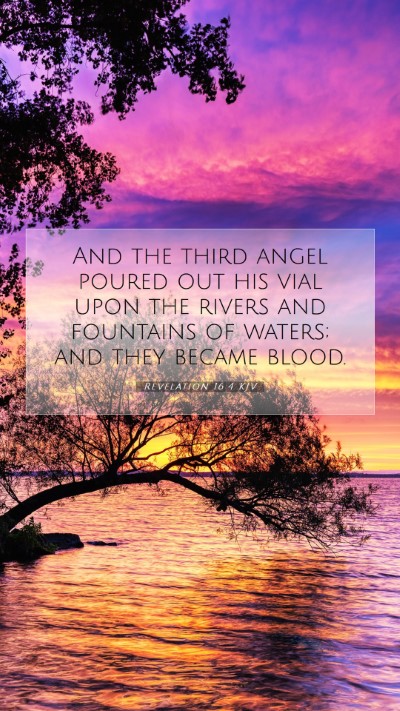Understanding Revelation 16:4
The verse Revelation 16:4 states:
"And the third angel poured out his vial upon the rivers and fountains of waters; and they became blood."
Overview of Revelation 16:4
This verse is part of the significant apocalyptic imagery found in the Book of Revelation, portraying God's judgment upon the earth. The act of turning the water into blood symbolizes divine retribution and serves as a stark reminder of the consequences of sin and rebellion against God.
Commentary Insights
Matthew Henry's Commentary
Henry notes that this plague represents the judgment of God on those who have rejected Him and mistreated His children. He emphasizes the severity of divine wrath, manifested in this transformation of life-sustaining elements into a form of death. This act is particularly poignant as it relates to the historical significance of blood in biblical narratives, representing life and purity being corrupted.
Albert Barnes' Commentary
According to Barnes, the reference to 'blood' indicates severe punishment. In the ancient world, water is a symbol of life, and by turning it into blood, it illustrates the removal of sustenance from the people. He also points out the broader symbolism, connecting this event with the plagues in Exodus, which serves to remind the reader of God's past judgments and the continuing consequences of sinfulness.
Adam Clarke's Commentary
Clarke suggests that this imagery highlights the reality of God's judgment against idol worship and corruption, referring to human rejection of divine truth. He draws parallels to the blood in relation to sacrifices and the divine covenant, thus emphasizing the seriousness with which God regards disobedience.
Combined Insights
The combined interpretations from these commentaries converge on a core understanding:
- Judgment of God: Revelation 16:4 is a vivid depiction of God’s wrath in response to human sin.
- Historical Context: Referencing past judgments (like those in Exodus) serves to deepen the impact of this judgment.
- Symbolic Transformation: The transformation of water to blood symbolizes a loss of life's essentials and a severe consequence of idolatry and rebellion.
Application of Revelation 16:4
In practical terms, believers are encouraged to reflect on the warnings embedded within this verse. It calls for a deep examination of one’s relationship with God and a thorough repentance from sin. The imagery serves to illustrate the importance of living a life aligned with divine will, avoiding idolatry, and recognizing the sanctity of the gifts God has provided, such as water, which can be seen as a metaphor for spiritual sustenance.
Cross References
- Exodus 7:14-25: The first plague of Egypt, where the Nile turns to blood, serving as a foundational parallel.
- Revelation 8:10-11: Also speaks to the consequences of sin with similar imagery regarding waters turned bitter.
- Psalm 78:44: Reflects God's historical judgments, linking back to divine retribution themes.
Conclusion
Revelation 16:4 encapsulates powerful themes of judgment and the consequences of disobedience. Understanding this verse requires a thorough exploration of its symbolic meaning and historical context, drawing valuable lessons for today's believers regarding the importance of faithfulness and obedience to God.
Further Study and Insights
For those involved in Bible study groups or online Bible study, this verse can be a central topic for discussion. It highlights the need for deep engagement with Bible study tools and resources to facilitate a better appreciation of scripture.
Consider exploring the historical context of Bible verses to deepen your understanding of Revelation 16:4 and its place within the broader narrative of Scripture.


